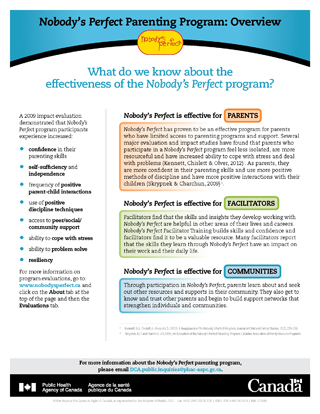What do we know about the effectiveness of the Nobody's Perfect program?

Download the alternative format
(PDF format, 245 KB, 2 pages)
Organization: Public Health Agency of Canada
Type: Fact Sheet
Date published: 2017-11-30
Related Topics
A 2009 impact evaluation demonstrated that Nobody’s Perfect program participants experience increased:
- confidence in their parenting skills
- self-sufficiency and independence
- frequency of positive parent-child interactions
- use of positive discipline techniques
- access to peer/social/community support
- ability to cope with stress
- ability to problem solve
- resiliency
For more information on program evaluations, go to Nobody's Perfect and click on the About tab at the top of the page and then the Evaluations tab.
Nobody’s Perfect is effective for parents
Nobody’s Perfect has proven to be an effective program for parents who have limited access to parenting programs and support. Several major evaluation and impact studies have found that parents who participate in a Nobody’s Perfect program feel less isolated, are more resourceful and have increased ability to cope with stress and deal with problems (Kennett, Chislett & Olver, 2012)Footnote 1.
As parents, they are more confident in their parenting skills and use more positive methods of discipline and have more positive interactions with their children (Skrypnek & Charchun, 2009)Footnote 2.
Nobody’s Perfect is effective for facilitators
Facilitators find that the skills and insights they develop working with Nobody’s Perfect are helpful in other areas of their lives and careers. Nobody’s Perfect Facilitator Training builds skills and confidence and facilitators find it to be a valuable resource. Many facilitators report that the skills they learn through Nobody’s Perfect have an impact on their work and their daily life.
Nobody’s Perfect is effective for communities
Through participation in Nobody’s Perfect, parents learn about and seek out other resources and supports in their community. They also get to know and trust other parents and begin to build support networks that strengthen individuals and communities.
What are the program theories that Nobody’s Perfect is based on?
Many theories of change and learning contributed to the development of Nobody’s Perfect.
Some of the learning theories and change theories that helped to form the foundations of the program include:
- Ecology
- Family Systems
- Social Support
- Self-Efficacy
- Empowerment
- Mutual aid
- Andragogy
- Constructivism
- Humanistic person-centered learning
For more information about the Nobody’s Perfect parenting program, please email DCA.public.inquiries@phac-aspc.gc.ca.